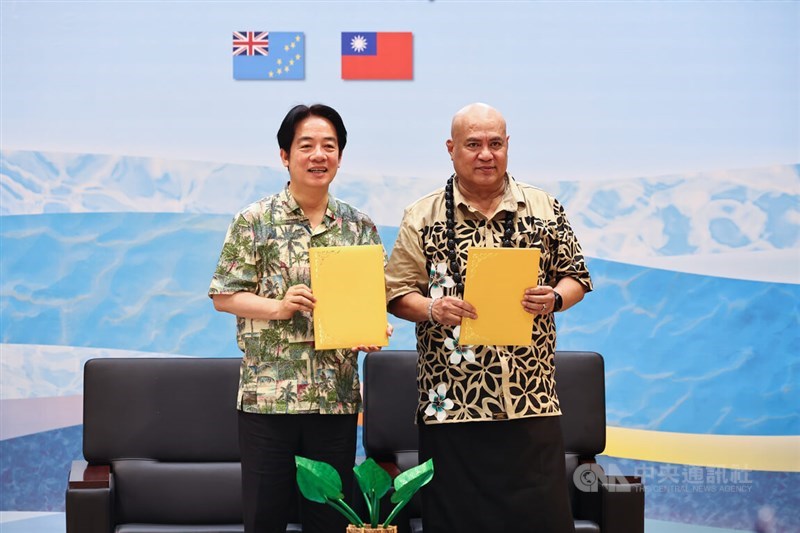Taiwan President William Lai Tuesday arrived in the Pacific nation of Tuvalu, with the two nations signing a joint communique on advancing their partnership.
Lai’s one-day trip to Tuvalu came ahead of a stopover in the U.S territory of Guam.
Earlier, he was in the Marshall Islands, where Marshallese President Hilda Heine expressed her government’s commitment to “remain a staunch ally” of Taiwan.
Tuvalu and the Marshall Islands are among 12 UN member nations that recognise Taiwan diplomatically.
Lai smiled and waved as he stepped off the plane in Tuvalu, where he was greeted by Tuvaluan Prime Minister Feleti Teo, Governor-General Tofiga Vaevalu Falani, schoolchildren, an honour guard, and a traditional song and dance performance.
“When I disembarked and saw Tuvaluan students waving the national flags of our two countries, I strongly felt the people’s firm commitment to our diplomatic alliance,” Lai said through a translator.
Looking relaxed in a colorful shirt, and with a garland of pink and yellow flowers around his neck, Lai said he hoped Taiwan and Tuvalu can “expand our cooperation to even more areas, thereby further strengthening our diplomatic partnership.”
In a speech, Teo expressed “Tuvalu’s thanks for Taiwan’s contribution” to a pool of funds used by the government to buy a submarine Internet cable, as well as its financial support for climate action.
In a joint communique on “advancing the comprehensive partnership,” the two sides agreed to “reassess the ongoing bilateral cooperation projects in order to establish a more durable, lasting and mutually beneficial diplomatic relations.”
Teo was named prime minister in February, a month after an election that put the nation’s recognition of Taiwan in question.
During the election campaign, Tuvaluan lawmaker Seve Paeniu had floated the idea that the new government could review its Taiwan ties.
That set off speculation about a looming shift in policy, but the new government has vowed to keep up its “special” relationship with Taiwan.
China has expressed anger at Lai’s weekend trip to Hawaii on his way to three Pacific allies.
Lai, who spent the night in Guam, is making what are formally only stopovers.
However, he spent two days in Hawaii, where he met with the governor, gave speeches and visited a World War II memorial.
Security sources told reporters that China could stage new war games around Taiwan as early as this weekend in response to the trip.
Mainland Affairs Council Minister Chiu Chui-cheng told reporters in Taipei that Lai’s trip to consolidate friendship with other countries was something that Taiwanese support.
However, “the Chinese communists threaten Taiwan with military hegemony, which I think is something our citizens do not agree with,” Chiu said. “This will only cause cross-strait relations to drift further and further away, and which will not be helpful to ties in the future.”
The international community should take China’s military drills and threats seriously, Chiu added.
Lai is to wrap up his week-long trip with a visit to ally Palau.














